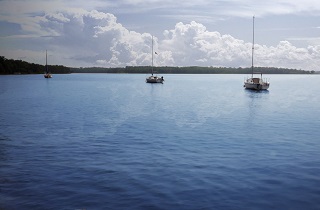Vitality Air is a consumer products company based in Edmonton, Alberta. It harnesses clean air from the Rocky Mountains, packages it in proprietary bottles and ships it around the globe.
Learn more about their export success here.
Moses Lam is president and CEO of Vitality Air.
When and why did you first start thinking about exporting as part of your business?
Immediately. I had posted test samples (in Ziploc bags) on e-Bay and had no idea if there was a market for Rocky Mountain air. To my surprise, they sold to customers in the U.S. After that, it was straight up supply and demand. People starting asking for more and more of the product.
What was your export journey like to get to where you are today?
It was explosive – a whirlwind. We didn’t have a choice if we wanted to take advantageof the business opportunity. Timing was critical in our case. We had a choice to either try and keep up with the demand or don’t and quit. We didn’t quit and while there have been many lessons learned, we’re doing great.
Is there a specific story/anecdote from your company’s history that you would consider a critical moment for your export journey?
Definitely breaking into the Chinese market. We had a shipment of our product hit our distributor the same day that many cities recorded a red alert for smog advisories. (Red alerts trigger advisories for people to stay inside, schools to stop classes, and restrict vehicle use.)
It was just luck, but consumers loved the product. We sold our initial shipment of 500 cans in a week and they wanted more. It’s helped us solidify Vitality Air’s presence in the [Chinese] market.
What is the biggest difference between selling in Canada and selling in another country? How did you adapt to that difference?
Shipping domestically is much easier. But that’s not our market. International markets are the majority of our sales and it’s more complicated and more expensive to ship internationally, especially when you have a new, revolutionary product like ours. It’s been a huge learning curve.
Also, people in international markets see the value in what we are selling, whereas people in Canada think that we are selling something that everyone can get for free. And that’s definitely not the case.
How has exporting changed the way you market/sell your products/services in Canada?
At the end of the day, we are Canadian and our heart will always be with Canada. But we did have to come up with some new and innovative marketing materials for international markets. The maple leaf is a great brand. People in South Korea, China and India love Canadian products and they love Canadian companies. To them, there’s something novel about imported products. It’s a bit of reverse engineering. For us, everything it seems, is made in China. People in China love products made in Canada.
Can you share the best lesson learned from a bad exporting experience?
For me it was definitely learning about Value Added Taxes (VAT). I didn’t know anything about that until our products were being charged the VAT and I hadn’t accounted for it. It was a really a hard lesson to learn, but an important one. So my advice is do your homework and know your market.
When it comes to exports, what do you know now that you wish you knew when you started exporting?
I wish I knew more about taxes and freight forwarding and going global in general. It’s been a huge learning curve for Vitality Air. It was a real crash course in global business — I wish I did more homework before [the first exports].
All about taxes and logistics, I wish I knew as much as I do now when I started. I’m becoming an expert in freight forwarding as well.
What is the #1 thing new SMEs need to know about exporting and trade?
Do your homework. Do the research upfront. Talk to people, as many people as you can. The more information the better. And most importantly, don’t be like Uber, ensure you comply with all regulatory requirements and agencies first, before launching.
What is one characteristic that you believe every exporter should possess?
Patience and endurance. If you want to be successful, you have to keep going. Learn and keep moving forward. You need to figure out what partners to work with and those to stay away from.





